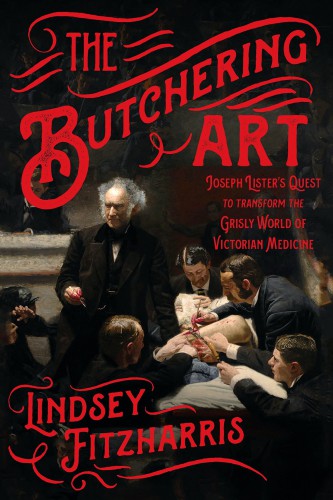
The Butchering Art
Joseph Lister's Quest to Transform the Grisly World of Victorian Medicine
پرس و جوی جوزف لیستری برای تبدیل دنیای وحشتناک پزشکی دوره ویکتوریا
کتاب های مرتبط
- اطلاعات
- نقد و بررسی
- دیدگاه کاربران
نقد و بررسی

Starred review from July 3, 2017
British science writer Fitzharris slices into medical history with this excellent biography of Joseph Lister, the 19th-century “hero of surgery.” Lister championed the destruction of microorganisms in surgical wounds, thus preventing deadly postoperative infections. This was a radical approach inspired by French microbiologist and chemist Louis Pasteur’s discovery of bacteria. Lister, whose Quaker father introduced him to the wonders of the microscope, became an evangelist for the germ theory of disease and the sterilization of both surgical instruments and doctors’ hands. The medical community resisted Lister’s procedures, but his successful treatment of Queen Victoria boosted his reputation and techniques—winning converts first in Scotland, then America, and finally London. “Lister’s methods transformed surgery from a butchering art to a modern science, one where newly tried and tested methodologies trumped hackneyed practices,” Fitzharris writes. She infuses her thoughtful and finely crafted examination of this revolution with the same sense of wonder and compassion Lister himself brought to his patients, colleagues, and students. “As he neared the end of his life, Lister expressed the desire that if his story was ever told, it would be done through his scientific achievements alone,” Fitzharris notes, respecting his wish and fulfilling it in the context of a remarkable life and time.

June 15, 2017
Our understanding of health and medicine has developed rapidly in the last 200 years. This book looks at a pivotal time in that development and one of the leading figures of modern medicine, Joseph Lister (1827-1912). Through observation, experimentation, and a passion to keep patients alive, Lister eventually overcame the prevailing beliefs of his day and saved countless lives. Readers will learn how breakthroughs such as pasteurization and the use of ether as an anesthesia led to a greater comprehension of bacteria and infection. Examples of cases, including personal accounts by patients, reveal frightening and painful surgery experiences. Descriptions of cringe-worthy hospital wards demonstrate how far we have come in our understanding of sanitation. Providing insight into Lister's character as well as detailing his life and death in England and Scotland are his personal relationships with colleagues, students, and his father. VERDICT A slightly gory, occasionally humorous, and very enjoyable biography of a man whose kindness, care, and curiosity changed medicine forever. An engaging read for history lovers.--Susanne Caro, Univ. of Montana Lib., Missoula
Copyright 2017 Library Journal, LLC Used with permission.

September 1, 2017
Medical historian and popular blogger Fitzharris narrates the quest of a tenacious 19th-century doctor to save his patients; in the process, he transformed the world of surgery and medicine.Joseph Lister's choice to become a surgeon was not the most obvious or reputable one for a Quaker growing up as the son of an esteemed scientist acclaimed for his improvements to the microscope. In the early 1800s, a surgeon was little more than a butcher, a "manual laborer who used his hands to make a living, much like a key cutter or plumber today." It didn't help that surgery was extremely risky for patients. The introduction of ether to British medicine in 1846 was a critical turning point because it afforded surgeons more time to perform procedures. However, patients were still dying of post-surgical infections in high numbers, and Louis Pasteur's ideas about germs were still academic and not widely disseminated. Lister took up Pasteur's work and applied it to surgery, experimenting and finally finding an antiseptic and technique that successfully lowered rates of postoperative infection. He made it his mission to share his findings with a medical establishment clinging to old beliefs. It is thanks to Lister's tenacity and belief in the efficacy of his techniques, despite widespread skepticism, that so many people today don't have to look at surgery as a possible death sentence. Fitzharris knows how to engage readers in fascinating and shocking details about medical history. She clearly, if sometimes quickly, explains medical and scientific terms and techniques while also using novelistic details and narrative techniques to move the story along. In deftly capturing an "epochal moment when medicine and science merged," the author also offers an important reminder that, while many regard science as the key to progress, it can only help in so far as people are willing to open their minds to embrace change.
COPYRIGHT(2017) Kirkus Reviews, ALL RIGHTS RESERVED.

October 1, 2017
In the nineteenth century, surgery was not exactly science or art but rather a dicey and gruesome affair. Prior to the discovery and widespread use of anesthetic agents, patients were awake during their operations, enduring unimaginable pain and horror. And if they survived the surgical procedure, death from postoperative infection remained a big risk. Medical historian Fitzharris captures the chaos, personalities, and bumpy evolution of surgery during the Victorian period. The star of the story is the man who devoted much of his life searching for the source and solution to the problem of hospital infections. Born in 1827, Joseph Lister was religious and driven by scientific curiosity. He contracted a mild case of smallpox, suffered from depression, and was a bit of a hypochondriac. He experimented on frog legs and corresponded with Louis Pasteur. He was interested in how wounds healed. Lister's advocacy of antiseptic principles in surgery was revolutionary but a hard sell. He traveled across Europe and America, arguing for the acceptance of germ theory and promoting disinfection. Hygiene had its hero.(Reprinted with permission of Booklist, copyright 2017, American Library Association.)

























دیدگاه کاربران